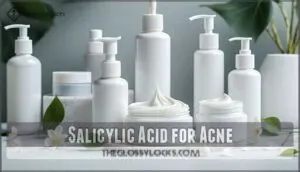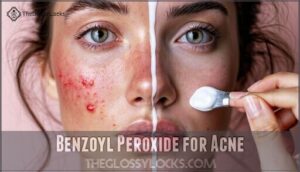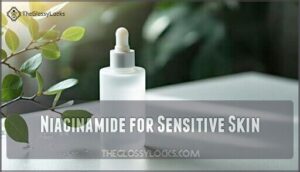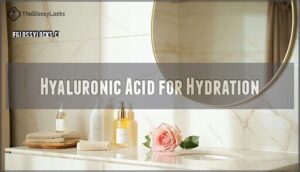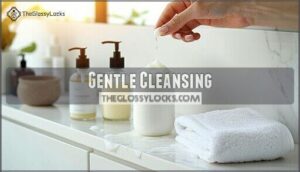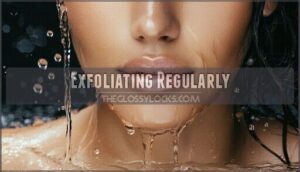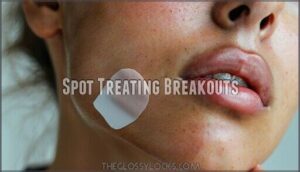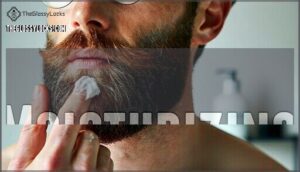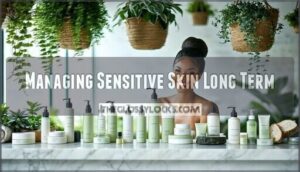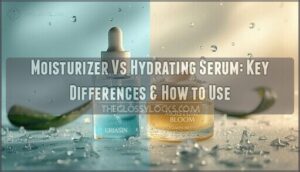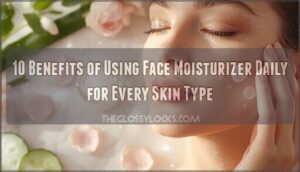This site is supported by our readers. We may earn a commission, at no cost to you, if you purchase through links.

Look for fragrance-free cleansers, lightweight moisturizers, and spot treatments featuring salicylic acid or adapalene.
Don’t let harsh scrubs or bold claims fool you—your skin needs its own safe space, not a battleground.
Products like Cetaphil Acne Moisturizer and Differin Gel calm inflammation while treating breakouts.
You’ll find that a consistent, soothing routine tames redness and keeps those “bad skin days” at bay.
There’s a science (and a little art) to it, and the next tips might just surprise you.
Table Of Contents
- Key Takeaways
- Sensitive Skin Acne Causes
- Top 10 Sensitive Skin Products
- 1. Cetaphil Acne Moisturizer with Salicylic Acid
- 2. Cetaphil Acne Face Wash Salicylic Acid
- 3. Differin Acne Treatment Gel 0.1 Adapalene
- 4. Pyunkang Yul Calming Skin Care Set
- 5. COSRX Snail Mucin Repair Cream
- 6. Differin Acne Face Wash 5 Benzoyl Peroxide
- 7. TIRTIR Milk Skin Toner Light
- 8. Centella Asiatica Ampoule Facial Serum
- 9. Differin Clay Mask Detox Soothe
- 10. Sensitive Skin Face Moisturizer
- Key Acne Fighting Ingredients
- Building Sensitive Skin Routine
- Managing Sensitive Skin Long Term
- Frequently Asked Questions (FAQs)
- How do you take care of sensitive acne-prone skin?
- What skincare do dermatologists recommend for acne?
- Which cream is good for sensitive, acne-prone skin?
- Which ingredient is best for sensitive, acne-prone skin?
- What do dermatologists recommend for acne on sensitive skin?
- Can sensitive skin be acne prone?
- What is the best treatment for sensitive skin acne?
- How do you treat hypersensitive skin acne?
- How often should I exfoliate sensitive skin with acne?
- Can I use makeup with sensitive skin and acne?
- Conclusion
Key Takeaways
- Stick to fragrance-free cleansers and lightweight moisturizers—these soothe your skin and prevent flare-ups without causing more irritation.
- Use low-dose actives like salicylic acid or benzoyl peroxide for spot treatment, and always go slow to avoid overwhelming sensitive, acne-prone skin.
- Avoid harsh scrubs, bold claims, or products jammed with potential irritants—your skin barrier needs consistent support, not constant change.
- Prioritize hydration and sunscreen, and stress management to keep redness down, breakouts in check, and your skin calm day after day.
Sensitive Skin Acne Causes
You might notice your skin flares up with acne at the worst possible times, often thanks to triggers like hormones, genetics, diet, or stress.
If washing your face feels like a delicate science experiment, you’re not alone—sensitive skin is just more likely to react to everyday stressors that others barely notice.
Hormonal Changes and Acne
Hormonal changes can turn your skin into a roller coaster, especially if you’ve got acne prone sensitive skin.
Here’s what kicks off hormonal acne:
- Puberty Acne—classic starter.
- Menstrual Breakouts—monthly surprise.
- Pregnancy Acne—expecting extra pimples.
- Menopause Acne—a late encore.
- Endocrine Disorders—unexpected triggers.
Choose sensitive acne skincare to support your skin through these shifts, and consider the impact of hormonal acne on your daily life.
Genetics and Acne
Blame your parents—at least a little—for stubborn acne. If family members struggled with breakouts, your own acne heritability and genetic predisposition probably play a role.
Certain gene variants can trigger a stronger inflammatory response, making your sensitive skin feel like it’s always walking on eggshells. That’s why some folks battle acneprone skin, no matter how gentle their routine.
For example, hormonal fluctuations trigger cystic acne development.
Diet and Acne
Watching what you eat can truly change how your acneprone skin behaves.
High Glycemic Index foods and dairy consumption might trigger breakouts and increase inflammation, especially if your sensitive skin isn’t a fan.
Focus on gut health, limit inflammatory foods, and boost hydration levels.
Pair these choices with soothing ingredients in your routine to help skin hydration and calm flare-ups, which can improve your overall skin hydration.
Stress and Acne
Racing through deadlines or tough weeks? Your skin feels it, too. Cortisol—the main stress hormone—ramps up oil, clogs pores, and stirs up the inflammation link between stress, gut health, and acne.
Take back control with:
- Steadier sleep routines (goodbye, sleep deprivation)
- Gentle acne treatment for sensitive skin
- Emotional coping habits
Redness reducing acne care helps soothe flare-ups.
Top 10 Sensitive Skin Products
You want products that won’t trigger breakouts or leave your skin feeling tight, and we’ve reviewed what actually works.
Here are the top ten sensitive skin care picks, clinically chosen to keep your skin calm, clear, and comfortable—no guesswork needed, with a focus on products that are gentle and comfortable.
1. Cetaphil Acne Moisturizer with Salicylic Acid
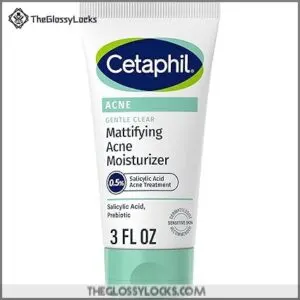
A good moisturizer feels like a glass of water for your face—Cetaphil Acne Moisturizer with Salicylic Acid does just that, hydrating for up to 48 hours while fighting breakouts.
Its lightweight, non-greasy texture makes it a favorite for sensitive, acne-prone skin.
With just 0.5% salicylic acid, it clears acne gently without over-drying, and you’ll notice less redness and smoother skin tone, plus a matte finish that keeps shine at bay.
Dermatologist-tested and fragrance-free, it’s a safe bet for daily use.
Best For: Sensitive, acne-prone adults looking for gentle, long-lasting hydration and clear skin without irritation.
- Lightweight and fast-absorbing, keeping skin matte and non-greasy
- 0.5% salicylic acid clears and prevents breakouts without over-drying
- Fragrance-free and hypoallergenic for sensitive skin
- May not provide enough moisture for cold, dry winter climates
- Occasional reports of increased pimples or texture inconsistencies
- Packaging mix-ups and variability between sizes have been noted
2. Cetaphil Acne Face Wash Salicylic Acid
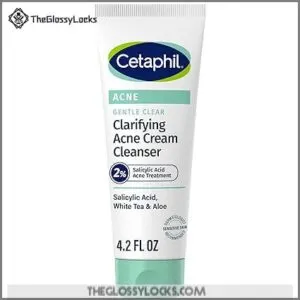
Sometimes your skin just needs something that won’t pick a fight.
Cetaphil Acne Face Wash with Salicylic Acid fits the bill—gentle, fragrance-free, and designed for reactive, acne-prone skin.
You get a creamy formula with 2% salicylic acid and soothing aloe to clear breakouts while defending against dryness and irritation.
Dermatologists often recommend it because it softens, cleanses, and keeps breakouts at bay.
If other washes have left your skin feeling tight, this one might finally be the peace treaty you need.
Best For: People with sensitive, acne-prone skin who want a gentle, fragrance-free cleanser that clears breakouts without over-drying.
- Creamy, non-drying formula with 2% salicylic acid and soothing ingredients like aloe and white tea.
- Clinically proven to treat and prevent breakouts while supporting the skin’s moisture barrier.
- Dermatologist recommended and suitable for daily use on sensitive skin.
- Some users with oily or combination skin report occasional dryness or bumps.
- Packaging can be difficult to use, making it hard to squeeze out the product.
- Reports of receiving products with short expiration dates or questionable authenticity.
3. Differin Acne Treatment Gel 0.1 Adapalene
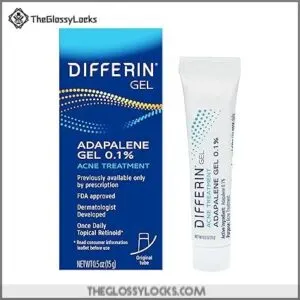
Balancing effective acne care with sensitive skin can feel like walking a tightrope, but Differin Gel 0.1% Adapalene makes the journey easier.
This water-based, fragrance-free retinoid dives deep into pores to unclog congestion, help clear breakouts, and prevent new ones from forming—all while lowering the risk of irritation.
You might see results in as little as a week, though patience pays off.
Start low and slow, moisturize well, and stick with it for smoother, clearer skin that actually feels like yours.
Best For: People with acne-prone, sensitive skin looking for an effective, over-the-counter retinoid to clear breakouts and prevent future acne.
- Clinically proven to clear up to 87% of acne breakouts after 12 weeks with continued improvement.
- Water-based, oil-free, fragrance-free, and non-comedogenic; suitable for sensitive skin.
- Superior tolerability compared to older retinoids, minimizing irritation and dryness.
- May cause an initial purge, making acne appear worse for 3-4 months.
- Skin can become more sensitive, requiring extra care and sunscreen.
- Results require patience and consistency, typically taking several weeks.
4. Pyunkang Yul Calming Skin Care Set
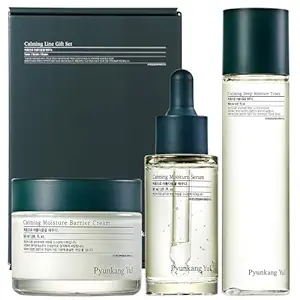
Pyunkang Yul Calming Skin Care Set is like a peace treaty for sensitive, acne-prone skin.
Packed with Centella asiatica and tea tree, it calms redness and soothes irritation without clogging pores.
Five types of hyaluronic acid hydrate deeply, while AHA and PHA gently exfoliate.
Users love its lightweight feel and zero stinging, with no stickiness left behind.
Fragrance-free and dermatologist-tested, it’s ideal when your skin throws a tantrum and needs a gentle reset, morning or night.
Best For: Anyone with sensitive, acne-prone, or easily irritated skin needing gentle hydration and calm.
- Lightweight, non-sticky texture absorbs fast and layers well.
- Deep hydration and soothing from natural, skin-safe ingredients.
- Fragrance-free, non-comedogenic, and dermatologist-tested for peace of mind.
- Some users find the set basic, offering only subtle improvements.
- Serum and cream sizes may feel small for the price.
- Not designed for those seeking dramatic anti-aging or brightening effects.
5. COSRX Snail Mucin Repair Cream
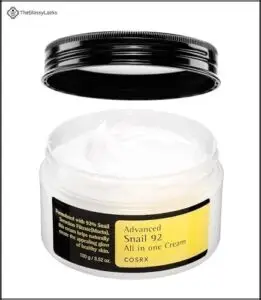
Ever wish your moisturizer could multitask like you do during finals week? Meet COSRX Snail Mucin Repair Cream.
With 92% snail mucin, this lightweight gel delivers hydration, repairs post-acne marks, and soothes all your “Why is my skin so angry?” moments.
You’ll get plump, smooth skin without the sticky aftermath. It’s fragrance-free, absorbs fast, and works for dry, sensitive, and even combination skin.
Just a dab morning and night, and you’re helping your skin bounce back—no shell required. This cream can help to replenish essential lipids for restoring your skin barrier.
Best For: Anyone with dry, sensitive, or combination skin looking for a lightweight, hydrating cream that repairs and soothes irritation while fading acne marks.
- Deep hydration without heaviness, leaving skin soft and non-greasy.
- Reduces redness, irritation, and post-acne marks with 92% snail mucin.
- Fragrance-free, hypoallergenic, and dermatologist-tested for sensitive skin.
- Not a standalone solution for deep wrinkles or severe hyperpigmentation.
- Some users with very oily skin or high sensitivity report occasional breakouts or peeling.
- May need extra moisturizer in harsh winter climates or for extremely dry skin.
6. Differin Acne Face Wash 5 Benzoyl Peroxide
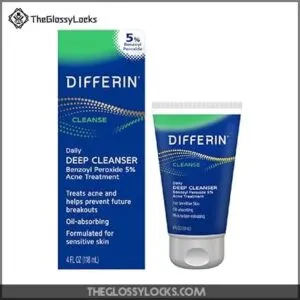
Breakouts beware—Differin Acne Face Wash 5 Benzoyl Peroxide packs a punch with 5% micronized benzoyl peroxide, targeting acne while steering clear of unnecessary irritation.
This formula dives deep into pores, zapping oil and bacteria, but won’t leave your skin dry or stripped.
Developed by dermatologists, it’s fragrance-free and non-comedogenic, ideal for sensitive types.
Just remember, start slow—think of it as easing into a cold pool, and if dryness strikes, layer with a gentle moisturizer and avoid mixing with other benzoyl peroxide products to minimize irritation.
Best For: Those with acne-prone, oily, or sensitive skin who need effective, gentle daily treatment without added fragrance.
- Deep cleans and targets acne with less irritation thanks to 5% micronized benzoyl peroxide.
- Non-comedogenic moisturizers prevent dryness and clogged pores.
- Developed by dermatologists and suitable for sensitive skin types.
- May cause dryness or peeling, especially if used too frequently or with other acne treatments.
- Can bleach hair, towels, or fabrics if not rinsed thoroughly.
- Some users report packaging issues and the product runs out quickly.
7. TIRTIR Milk Skin Toner Light
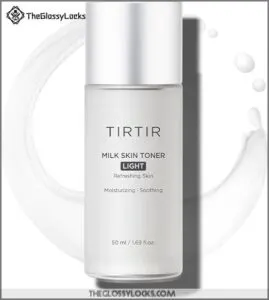
When your skin craves hydration without the stickiness, TIRTIR Milk Skin Toner Light steps in with science on its side.
With 4% niacinamide, rice bran extract, and ceramide, this toner balances sebum while soothing even the pickiest complexions.
Gentle enough for daily use, it’s free from alcohol, scent, and harsh fillers.
Users love its quick absorption and featherlight feel—think “glass skin” instead of “greased lightning.”
If your face acts up at the hint of irritation, this toner brings calm back to the surface.
Best For: Anyone with oily, sensitive, or acne-prone skin seeking lightweight hydration and a dewy, glass-skin finish.
- Calms, hydrates, and balances skin without stickiness or heaviness.
- Non-comedogenic, alcohol-free, and free of harsh fillers, reducing irritation.
- Absorbs quickly, leaving skin visibly brighter and smoother.
- Thin, watery texture may feel too light for those preferring richer products.
- Some users find value for price underwhelming.
- Rare reports of increased texture or sensitivity, so patch testing is recommended.
8. Centella Asiatica Ampoule Facial Serum
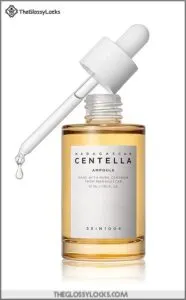
Between staying calm and looking great, the Centella Asiatica Ampoule Facial Serum pulls double duty.
This lightweight, watery serum instantly cools and soothes even the touchiest skin, cutting redness and deflating angry acne.
With seven times more active centella than the usual stuff, it battles inflammation, hydrates, and repairs your barrier with zero greasy after-feel—no wonder it’s a go-to for both hormonal breakouts and lingering scars.
Layer it under makeup or use after shaving; either way, your face will thank you, and it will be looking great with zero greasy after-feel.
Best For: Anyone with sensitive, acne-prone, or easily irritated skin who wants fast soothing, hydration, and improved texture without greasiness.
- Calms redness and irritation instantly, even after shaving or sun exposure.
- Lightweight formula deeply hydrates and absorbs fast, leaving no residue.
- Helps fade acne scars and speeds up skin healing with visible results.
- Results for dark spots and scars take several weeks to appear.
- May not be hydrating enough as a stand-alone product for very dry skin.
- Mild irritation is possible if you’re extremely sensitive to new ingredients.
9. Differin Clay Mask Detox Soothe
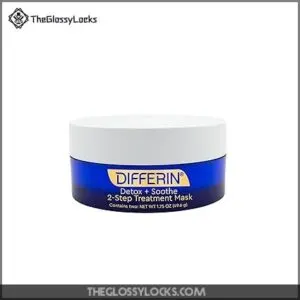
A two-step treat, Differin Clay Mask Detox Soothe is like pressing a reset button for sensitive, acne-prone skin.
The self-warming clay draws out impurities in just three minutes, while the cooling blue tansy gel feels like aloe after too much sun.
It’s noncomedogenic and dermatologist-tested, so your pores won’t freak out.
If you’re juggling oily patches and dry spots, this mask helps without stripping moisture.
Just patch test first—some folks with ultra-sensitive skin feel the heat a little too much.
Best For: Those with sensitive, acne-prone, or combination skin who want a quick, gentle detox without drying out or clogging pores.
- Two-step system delivers both deep cleansing and soothing hydration.
- Self-warming clay opens pores and removes impurities quickly (3 minutes).
- Noncomedogenic, dermatologist-tested, and packed with calming ingredients like blue tansy and licorice extract.
- Warming step may feel too intense for very sensitive or reactive skin types.
- Some users find the cooling gel slightly greasy if left on overnight.
- Not potent enough for those seeking stronger, clinical-grade acne treatment.
10. Sensitive Skin Face Moisturizer
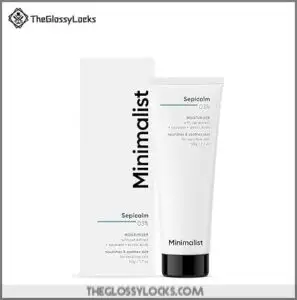
In addressing the challenges of sensitive, acne-prone skin, don’t skip a moisturizing step.
Choose a lightweight, non-comedogenic option with ingredients like shea butter, polyglutamic acid, and colloidal oat, which lock in hydration without clogging pores.
Bonus points if it’s fragrance-free and hypoallergenic—no need to court extra drama!
Apply twice a day for best results, letting your skin soak up all that comfort.
After all, your face deserves the easy life, not a battleground.
Best For: Sensitive, acne-prone skin needing lightweight, daily hydration without added irritants.
- Ultra-hydrating with polyglutamic acid and shea butter for long-lasting moisture
- Soothes and calms sensitive or irritated skin with oat extract and Sepicalm
- Fragrance-free, non-comedogenic, and hypoallergenic—great for sensitive types
- Not moisturizing enough for severe dryness or dry patches
- Requires frequent reapplication in very dry conditions
- Expensive for the small size and frequent use
Key Acne Fighting Ingredients
When you’re shopping for acne treatments, it’s easy to feel like you need a chemistry degree just to read the labels.
To help you cut through the confusion, here’s what you need to know about the ingredients that actually work for sensitive, acne-prone skin.
Salicylic Acid for Acne
If you’re moving from exploring top products to battling breakouts, salicylic acid is a gentle hero for acne skincare sensitive routines.
Its oil-soluble Salicylic Strength dives into pores without causing a fuss. With Formulation Types from washes to spot treatments, keep Usage Frequency low and steady.
Salicylic acid’s anti-inflammatory properties can help reduce redness. Pair wisely—Product Combinations matter to keep Acid Sensitivity in check for nonirritating acne care.
Benzoyl Peroxide for Acne
If salicylic acid hasn’t cleared things up, benzoyl peroxide (BP) might do the trick.
Start with a BP concentration around 2.5%—it works just as well as higher levels but is gentler on sensitive skin.
For acne treatment, use it once daily, manage irritation with a light moisturizer, and don’t mix with harsh product combinations.
Benzoyl peroxide works by unclogging pores and reducing acne-causing bacteria.
Prescription options exist if drugstore picks underwhelm.
Niacinamide for Sensitive Skin
With niacinamide, you’re not just fighting breakouts—you’re giving your sensitive skin a shield.
Here’s why it works:
- Low irritation potential—won’t flare redness relief or dryness.
- Concentration levels of 2–5% deliver Niacinamide Benefits best.
- Combining actives? Niacinamide plays nice.
- Smart product selection means better antiinflammatory acne control.
Hyaluronic Acid for Hydration
In the context of hydration, hyaluronic acid (HA) stands out as a must-have.
You’ll find HA serum offers lightweight moisture, suiting sensitive skin and acne concerns.
Think of HA benefits like a sponge, plumping your skin barrier without feeling heavy.
HA application is simple, but watch for rare HA side-effects.
Not keen? Glycerin is a solid HA alternative.
Centella Asiatica for Soothing
If your skin feels like it’s auditioning for a drama series—always red, angry, or sensitive—give Centella (a.k.a. CICA) a starring role.
CICA benefits sensitive skin by calming irritation, reducing breakouts, and boosting repair.
Research shows antiinflammatory CICA forms team up with other soothing ingredients, making CICA combinations ideal for acne, and they are gentle, proven, and easy to trust!
Building Sensitive Skin Routine
Building an effective sensitive skin routine means starting with gentle cleansing, gradual use of active ingredients, and consistent hydration to prevent irritation and breakouts.
You won’t need a chemistry degree, but following the right steps can help keep your skin calm and clear, even if it sometimes seems pickier than a toddler at dinnertime.
Gentle Cleansing
Your morning’s cleanse isn’t a boot camp—think of it as a gentle handshake with your face.
Use a hydrating cleanser or mild formula and stick to lukewarm water for comfort. Skip gritty scrubs and harsh soaps; a sensitive skin cleanser or gentle acne treatment keeps things calm.
Using a gentle cleanser can help reduce breakouts. Twice-daily cleansing frequency helps you maintain balance, so irritation stays away.
Exfoliating Regularly
Once you’ve mastered gentle cleansing, it’s time to think about exfoliating regularly.
Chemical Exfoliation—like those exfoliating skincare products with salicylic acid benefits—gently helps with dead skin cell removal.
Limit exfoliation frequency to once or twice a week and watch for over-exfoliation risks.
Always practice careful post-exfoliation care with sensitive skin acne products to keep irritation at bay.
Spot Treating Breakouts
Spot treating breakouts on sensitive skin means using Targeted Application—think of it as “hit the spot” therapy.
Choose Ingredient Strength wisely, keeping it low to avoid drama.
Try Overnight Treatments like gentle acne spot treatment patches.
Always do a quick Patch Testing first; no one wants surprise fireworks.
For effective solutions, consider using an acne spot treatment.
You’ll see Inflammation Reduction and smaller pimples, without irritating the neighborhood (your face).
Moisturizing
Locking in those active spot treatments, now it’s all about keeping your sensitive skin hydrated.
Choose a moisturizer with:
- Hydration Methods for deep nourishment
- Humectant Properties to draw in moisture
- Emollient Effects for a soft feel
- Occlusive Benefits to seal everything tight
Ceramides help repair your skin barrier, so don’t skip this step to ensure deep nourishment!
Sunscreen
Choosing the right sunscreen is like finding the right pair of shoes—it needs to fit just right.
For sensitive skin and acne concerns, mineral sunscreens with higher SPF levels offer UV protection and redness relief, while chemical sunscreen may sting.
Those seeking alternatives might explore mineral sunscreen options.
Apply generously, and remember reapplication frequency matters; use gentle techniques to avoid irritation, and always prioritize protection—you’ll thank yourself later.
Managing Sensitive Skin Long Term
Managing sensitive skin for the long haul takes patience, consistency, and a willingness to laugh off the occasional breakout that shows up right before a big event.
With steady care and a few smart habits, you’ll keep your skin healthy and comfortable, even when life gets unpredictable.
Consistency is Key
If you’ve ever tried to bake bread, you know missing a step ruins the loaf—skincare works the same way.
Routine adherence and habit formation are essential for long-term results. Stick with gentle formulas, avoid bouncing between products, and let your skin barrier build strength gradually.
Product cycling may seem tempting, but gradual improvement always wins with sensitive skin and acne.
To further minimize irritation, consider using fragrance-free products for sensitive skin.
Being Patient
In the case of sensitive skin and acne, patience is your best friend.
Don’t expect overnight miracles—gradual introduction of new products and slow changes can help you avoid irritation and skin reactivity.
Stick to a consistent routine, set realistic expectations, and track progress over weeks.
Think marathon, not sprint—healthy skin needs time to adjust and heal.
Staying Hydrated
After sticking with your routine, don’t underestimate the Hydration Importance for sensitive skin.
Skin barrier care really means drinking water and picking a moisturizer loaded with humectants.
Pay attention to Environmental Factors—dry air can sap your skin fast.
Remember:
- Use humectant-rich moisturizers
- Add a gentle occlusive layer
- Drink water throughout the day
- Avoid harsh, drying cleansers to maintain skin barrier care.
Managing Stress
Balance is key—think of stress as a silent partner in skin trouble.
Practicing stress reduction and mindfulness helps you regulate emotions, support sleep hygiene, and strengthen your skin barrier.
Exercise benefits both mind and skin, keeping inflammation and acne at bay, leading to calm days.
Calm days mean fewer flare-ups, letting your sensitive skin and those carefully chosen skin care products work smarter, not harder, which is essential for maintaining healthy skin and a strong skin barrier.
Frequently Asked Questions (FAQs)
How do you take care of sensitive acne-prone skin?
Is your skin always throwing a tantrum?
Gently cleanse twice daily, moisturize, and choose fragrance-free, non-comedogenic products.
Skip harsh scrubs; sunscreen’s your friend.
Test new products on your wrist—no one likes a surprise breakout cameo!
What skincare do dermatologists recommend for acne?
Dermatologists say use a gentle cleanser, lightweight non-comedogenic moisturizer, and broad-spectrum sunscreen daily.
For acne, try a mild salicylic acid or low-dose benzoyl peroxide.
Start slow, and listen to your skin—no need to play chemist!
Which cream is good for sensitive, acne-prone skin?
Finding creams for sensitive, acne-prone skin can feel like walking a tightrope; you don’t want more redness or breakouts.
Reach for gentle, fragrance-free moisturizers with ceramides or niacinamide—think CeraVe, Curology, or Acure.
Which ingredient is best for sensitive, acne-prone skin?
Go for niacinamide if you want less redness and balanced oil.
Or try ceramides to support your skin barrier.
Salicylic acid keeps pores clean—just don’t overdo it or your face might think it’s toast.
What do dermatologists recommend for acne on sensitive skin?
Did you know nearly 58% of folks with acne struggle with sensitive skin?
To keep irritation at bay, try gentle cleansers, low-dose salicylic acid, fragrance-free moisturizers, and mineral SPF—think soothing, not stripping.
Avoid harsh scrubs entirely, and opt for soothing methods to manage your skin.
Can sensitive skin be acne prone?
Absolutely, you can have sensitive skin that’s also acne-prone—like juggling eggs on a tightrope.
When your natural barrier’s thrown off, it’s easier to break out and react to products.
Slow and steady wins this race.
What is the best treatment for sensitive skin acne?
Start with a gentle cleanser, soothing moisturizer, and sunscreen made for sensitive types.
Toss in a mild salicylic acid or benzoyl peroxide, but don’t go overboard—your skin’s not a dirty dish needing a scrub!
How do you treat hypersensitive skin acne?
Like walking a tightrope, managing hypersensitive skin with acne means using mild cleansers, fragrance-free moisturizers, and low-strength actives.
Think slow and gentle—always patch test, go for non-comedogenic formulas, and don’t skip sunscreen.
How often should I exfoliate sensitive skin with acne?
Aim to exfoliate just once or twice per week with a gentle product—think of it as a light spring cleaning, not a deep scrub.
Overdoing it can leave your skin extra sensitive and a bit cranky, which is why it’s essential to find the right balance and exfoliate gently.
Can I use makeup with sensitive skin and acne?
Ever heard the phrase “less is more”?
You can use makeup with sensitive, acne-prone skin—just choose non-comedogenic, fragrance-free formulas.
Remove makeup gently, and never sleep in it.
Your skin will thank you for the kindness.
Conclusion
Funny how, just when you think you’ve tried everything, the right sensitive skin care products for acne prone skin can make all the difference.
By choosing gentle, science-backed solutions and maintaining consistency, you’ll give your skin the support it needs—no more harsh experiments or frantic scrubbing required.
Stick to evidence-based routines, hydrate well, and tackle stress.
Your skin’s best days may be ahead, and yes, it only takes a little patience—and the right products—to get there.
- https://onlinelibrary.wiley.com/doi/10.1155/2023/6528850
- https://www.gminsights.com/industry-analysis/acne-prone-sensitive-skin-care-products-market
- https://pmc.ncbi.nlm.nih.gov/articles/PMC5595600/
- https://eightsaintsskincare.com/blogs/page-eight/ready-to-banish-breakouts-for-good-here-are-acne-ingredients-that-work
- https://www.mayoclinic.org/diseases-conditions/acne/in-depth/acne-treatments/art-20045814

